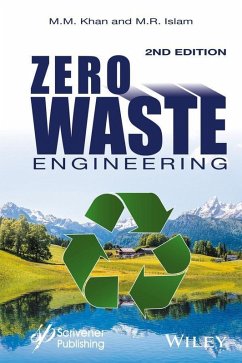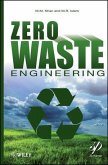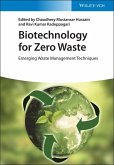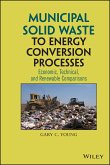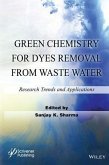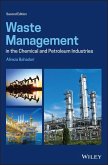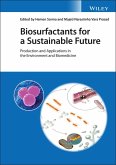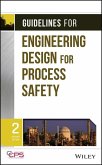Zero Waste Engineering (eBook, ePUB)
A New Era of Sustainable Technology Development


Alle Infos zum eBook verschenken

Zero Waste Engineering (eBook, ePUB)
A New Era of Sustainable Technology Development
- Format: ePub
- Merkliste
- Auf die Merkliste
- Bewerten Bewerten
- Teilen
- Produkt teilen
- Produkterinnerung
- Produkterinnerung

Hier können Sie sich einloggen

Bitte loggen Sie sich zunächst in Ihr Kundenkonto ein oder registrieren Sie sich bei bücher.de, um das eBook-Abo tolino select nutzen zu können.
Is "zero waste engineering" possible? This book outlines how to achieve zero waste engineering, following natural pathways that are truly sustainable. Using methods that have been developed in various areas for sustainability purposes, such as new mathematical models, recyclable material selection, and renewable energy, the authors probe the principles of zero waste engineering and how it can be applied to construction, energy production, and many other areas of engineering. This groundbreaking new volume: * Explores new scientific principles on which sustainability and zero waste engineering…mehr
- Geräte: eReader
- mit Kopierschutz
- eBook Hilfe
- Größe: 20.25MB
![Zero Waste Engineering (eBook, ePUB) Zero Waste Engineering (eBook, ePUB)]() M. M. KhanZero Waste Engineering (eBook, ePUB)183,99 €
M. M. KhanZero Waste Engineering (eBook, ePUB)183,99 €![Biotechnology for Zero Waste (eBook, ePUB) Biotechnology for Zero Waste (eBook, ePUB)]() Biotechnology for Zero Waste (eBook, ePUB)169,99 €
Biotechnology for Zero Waste (eBook, ePUB)169,99 €![Municipal Solid Waste to Energy Conversion Processes (eBook, ePUB) Municipal Solid Waste to Energy Conversion Processes (eBook, ePUB)]() Gary C. YoungMunicipal Solid Waste to Energy Conversion Processes (eBook, ePUB)96,99 €
Gary C. YoungMunicipal Solid Waste to Energy Conversion Processes (eBook, ePUB)96,99 €![Green Chemistry for Dyes Removal from Waste Water (eBook, ePUB) Green Chemistry for Dyes Removal from Waste Water (eBook, ePUB)]() Green Chemistry for Dyes Removal from Waste Water (eBook, ePUB)177,99 €
Green Chemistry for Dyes Removal from Waste Water (eBook, ePUB)177,99 €![Waste Management in the Chemical and Petroleum Industries (eBook, ePUB) Waste Management in the Chemical and Petroleum Industries (eBook, ePUB)]() Alireza BahadoriWaste Management in the Chemical and Petroleum Industries (eBook, ePUB)145,99 €
Alireza BahadoriWaste Management in the Chemical and Petroleum Industries (eBook, ePUB)145,99 €![Biosurfactants for a Sustainable Future (eBook, ePUB) Biosurfactants for a Sustainable Future (eBook, ePUB)]() Biosurfactants for a Sustainable Future (eBook, ePUB)179,99 €
Biosurfactants for a Sustainable Future (eBook, ePUB)179,99 €![Guidelines for Engineering Design for Process Safety (eBook, ePUB) Guidelines for Engineering Design for Process Safety (eBook, ePUB)]() Ccps (Center For Chemical Process Safety)Guidelines for Engineering Design for Process Safety (eBook, ePUB)126,99 €
Ccps (Center For Chemical Process Safety)Guidelines for Engineering Design for Process Safety (eBook, ePUB)126,99 €-
-
-
Dieser Download kann aus rechtlichen Gründen nur mit Rechnungsadresse in A, B, BG, CY, CZ, D, DK, EW, E, FIN, F, GR, HR, H, IRL, I, LT, L, LR, M, NL, PL, P, R, S, SLO, SK ausgeliefert werden.
- Produktdetails
- Verlag: Polity
- Seitenzahl: 704
- Erscheinungstermin: 10. November 2016
- Englisch
- ISBN-13: 9781119184942
- Artikelnr.: 47138914
- Verlag: Polity
- Seitenzahl: 704
- Erscheinungstermin: 10. November 2016
- Englisch
- ISBN-13: 9781119184942
- Artikelnr.: 47138914
- Herstellerkennzeichnung Die Herstellerinformationen sind derzeit nicht verfügbar.
Sugar
Saccharin®
Aspartame®) Pathway 322 5.10 Honey and Cancer 344 5.11 The Sugar Culture and Beyond 362 5.12 The Culture of the Artificial Sweetener 368 5.13 The Honey-Sugar-Saccharin-Aspartame Degradation in Everything 406 5.14 The Nature Science Approach 411 5.15 A New Approach to Product Characterization 413 5.16 A Discussion 416 5.17 Conclusions 419 6 Zero-Waste Lifestyle with Inherently Sustainable Technologies 421 6.1 Introduction 421 6.2 Energy from Kitchen Waste (KW) and Sewage 425 6.3 Utilization of Produced Waste in a Desalination Plant 432 6.4 Solar Aquatic Process to Purify Desalinated/Waste Water 438 6.5 Direct Use of Solar Energy 445 6.6 Sustainability Analysis 451 7 A Novel Sustainable Combined Heating/Cooling/Refrigeration System 455 7.1 Introduction 455 7.2 Einstein Refrigeration Cycle 458 7.3 Thermodynamic Model and its Cycle's Energy Requirement 460 7.4 Solar Cooler and Heat Engine 463 7.5 Actual Coefficient of Performance (COP) Calculation 464 7.6 Absorption Refrigeration System 466 7.7 Calculation of Global Efficiency 468 7.8 Solar Energy Utilization in the Refrigeration Cycle 475 7.9 The New System 476 7.8 Pathway Analysis 478 7.9 Sustainability Analysis 482 7.10 Conclusions 484 8 A Zero-Waste Design for Direct Usage of Solar Energy 487 8.1 Introduction 487 8.2 The prototype 491 8.3 Results and Discussion of Parabolic Solar Technology 495 8.4 Conclusions 502 9 Investigation of Vegetable Oil as The Thermal Fluid in A Parabolic Solar Collector 503 9.1 Introduction 503 9.2 Experimental Setup and Procedures 507 9.3 Experimental Procedure 511 9.4 Results and Discussion 511 9.5 Conclusions 515 10 The Potential of Biogas in Zero-Waste Mode of a Cold-Climate Environment 517 10.1 Introduction 517 10.2 Background 518 10.3 Biogas Fermentation 520 10.4 Factors Involved in Anaerobic Digestion 521 10.5 Heath and Environmental Issue 526 10.6 Digesters in Cold Countries 528 10.7 Experimental Setup and Procedures 529 10.8 Discussion 532 10.9 Conclusions 536 11 The New Synthesis: Application of All Natural Materials for Engineering Applications 537 11.1 Introduction 537 11.2 Metal Waste Removal with Natural Materials 538 11.3 Natural Materials as Bonding Agents 544 12 Economic Assessment of Zero-Waste Engineering 569 12.1 Introduction 569 12.2 Delinearized History of the Modern Era 570 12.3 Insufficiency of Conventional Economic Models 581 12.4 The New Synthesis 584 12.5 The New Investment Model, Conforming to the Information Age 587 12.6 The Most Important Research Questions in the Information Age 590 12.7 Future Engineering Projects 594 12.8 Economics of Zero-Waste Engineering Projects 595 12.9 Quality of Energy 605 12.10 Conclusions 607 13 General Conclusions and Recommendations 609 13.1 Summary 609 13.2 Conclusions 613 13.3 Recommendations 615 13.4 Future Projects 616 References and Bibliography 619 Index 665
Sugar
Saccharin®
Aspartame®) Pathway 322 5.10 Honey and Cancer 344 5.11 The Sugar Culture and Beyond 362 5.12 The Culture of the Artificial Sweetener 368 5.13 The Honey-Sugar-Saccharin-Aspartame Degradation in Everything 406 5.14 The Nature Science Approach 411 5.15 A New Approach to Product Characterization 413 5.16 A Discussion 416 5.17 Conclusions 419 6 Zero-Waste Lifestyle with Inherently Sustainable Technologies 421 6.1 Introduction 421 6.2 Energy from Kitchen Waste (KW) and Sewage 425 6.3 Utilization of Produced Waste in a Desalination Plant 432 6.4 Solar Aquatic Process to Purify Desalinated/Waste Water 438 6.5 Direct Use of Solar Energy 445 6.6 Sustainability Analysis 451 7 A Novel Sustainable Combined Heating/Cooling/Refrigeration System 455 7.1 Introduction 455 7.2 Einstein Refrigeration Cycle 458 7.3 Thermodynamic Model and its Cycle's Energy Requirement 460 7.4 Solar Cooler and Heat Engine 463 7.5 Actual Coefficient of Performance (COP) Calculation 464 7.6 Absorption Refrigeration System 466 7.7 Calculation of Global Efficiency 468 7.8 Solar Energy Utilization in the Refrigeration Cycle 475 7.9 The New System 476 7.8 Pathway Analysis 478 7.9 Sustainability Analysis 482 7.10 Conclusions 484 8 A Zero-Waste Design for Direct Usage of Solar Energy 487 8.1 Introduction 487 8.2 The prototype 491 8.3 Results and Discussion of Parabolic Solar Technology 495 8.4 Conclusions 502 9 Investigation of Vegetable Oil as The Thermal Fluid in A Parabolic Solar Collector 503 9.1 Introduction 503 9.2 Experimental Setup and Procedures 507 9.3 Experimental Procedure 511 9.4 Results and Discussion 511 9.5 Conclusions 515 10 The Potential of Biogas in Zero-Waste Mode of a Cold-Climate Environment 517 10.1 Introduction 517 10.2 Background 518 10.3 Biogas Fermentation 520 10.4 Factors Involved in Anaerobic Digestion 521 10.5 Heath and Environmental Issue 526 10.6 Digesters in Cold Countries 528 10.7 Experimental Setup and Procedures 529 10.8 Discussion 532 10.9 Conclusions 536 11 The New Synthesis: Application of All Natural Materials for Engineering Applications 537 11.1 Introduction 537 11.2 Metal Waste Removal with Natural Materials 538 11.3 Natural Materials as Bonding Agents 544 12 Economic Assessment of Zero-Waste Engineering 569 12.1 Introduction 569 12.2 Delinearized History of the Modern Era 570 12.3 Insufficiency of Conventional Economic Models 581 12.4 The New Synthesis 584 12.5 The New Investment Model, Conforming to the Information Age 587 12.6 The Most Important Research Questions in the Information Age 590 12.7 Future Engineering Projects 594 12.8 Economics of Zero-Waste Engineering Projects 595 12.9 Quality of Energy 605 12.10 Conclusions 607 13 General Conclusions and Recommendations 609 13.1 Summary 609 13.2 Conclusions 613 13.3 Recommendations 615 13.4 Future Projects 616 References and Bibliography 619 Index 665
